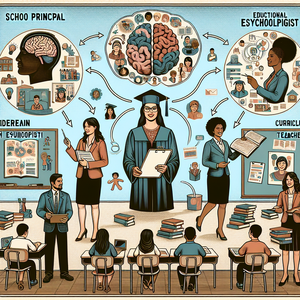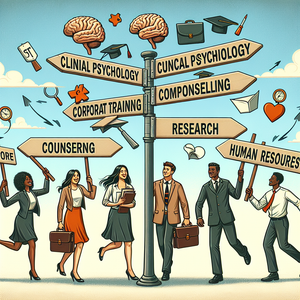
Navigating 15 Unique Career Paths in Education: Roles, Responsibilities, and Requirements
The education sector is a dynamic and multifaceted field that offers a plethora of career opportunities beyond traditional teaching roles. Recent trends illustrate a growing demand for diverse positions—including administrative roles, specialized support staff, and innovative positions in educational technology (edtech). While teaching remains a cornerstone of education, roles like education coordinators, school counselors, and instructional designers are gaining recognition for their significant contributions to student success. This transformation signals a more collaborative approach to education, emphasizing the integration of technology and the increasing need for effective educational administrators. The current job market presents an array of opportunities tailored to various interests and skill sets, making it an exciting time for those passionate about education to explore different career pathways. This article delves into 15 prominent jobs within the education sector, outlining their responsibilities, requirements, and how they align with contemporary educational needs.
Job Summaries:
School Counselor:
- School counselors play a crucial role in fostering students' academic, social, and emotional growth.
- They assist with academic planning, career choices, and personal issues through individual and group counseling.
- Typically, a master's degree in counseling or psychology and state certification are necessary, coupled with strong communication and interpersonal skills.
- As awareness of mental health increases, the demand for school counselors is rising, making this a fulfilling career path.
Educational Coordinator:
- Educational coordinators are responsible for developing and implementing programs and curricula within educational institutions.
- They work closely with teachers and administrators to create initiatives that enhance student learning and engagement.
- A bachelor’s degree in education or a related field is usually required.
- Experience in educational settings and strong organizational skills are important.
Instructional Designer:
- Instructional designers create engaging educational materials and learning experiences, often leveraging technology.
- They assess learning needs and design curricula that cater to diverse learning styles, integrating multimedia resources.
- A bachelor’s degree in instructional design or educational technology is typically required, along with experience in curriculum development.
Special Education Teacher:
- Special education teachers work with students with disabilities, customizing instructional methods to meet individual needs.
- They develop personalized education plans (IEPs).
- They collaborate with parents and therapists.
- They adapt classroom environments to support learning.
- A bachelor’s degree in special education and state certification are essential.
- Strong advocacy and communication skills are important.
Curriculum Developer:
- Curriculum developers focus on designing and improving educational programs to align with academic standards.
- They conduct research, collaborate with educators, and analyze assessment data to create effective learning experiences.
- A bachelor’s degree in education or a related field is generally required, along with teaching and curriculum development experience.
Education Program Specialist:
- Education program specialists develop and administer programs for schools, districts, or educational organizations.
- They evaluate program effectiveness.
- Provide training for educators.
- Ensure compliance with regulations.
- A bachelor’s degree in education or a related field is usually required.
- Experience in program management is usually required.
School Librarian:
- School librarians manage library resources and services, promoting a love for reading among students.
- They curate collections, develop literacy programs, and provide instruction on information literacy skills.
- A master’s degree in library science and state certification are typically required, along with strong organizational skills.
Educational Technology Specialist:
- Educational technology specialists facilitate the integration of technology into teaching and learning.
- They train educators on effectively using digital tools, ensuring technology enhances educational outcomes.
- A bachelor’s degree in education or information technology is generally required, along with tech support experience.
Vice Principal:
- Vice principals assist principals in managing daily operations.
- They supervise staff and implement curriculum.
- They oversee specific programs.
- They contribute to fostering a positive school culture.
- A master’s degree in education administration is typically required.
- Administrative certification is typically required.
- Strong leadership skills are necessary.
Academic Advisor:
- Academic advisors help students select courses and plan their academic paths.
- They provide resources to support students in achieving their goals and navigating transitions.
- A bachelor’s degree in education or a related field is usually required, along with strong interpersonal skills.
Teacher Trainer:
- Teacher trainers develop professional development programs for educators.
- They focus on effective teaching strategies.
- They assess training needs and provide feedback to enhance teaching skills.
- A master’s degree in education or a related field is typically required.
- Teaching experience is also required.
Education Policy Analyst:
- Education policy analysts research and analyze educational policies, providing recommendations for improvements.
- They evaluate data and advocate for policies that promote equitable access to education.
- A master’s degree in public policy or education is often required, along with strong analytical skills.
Higher Education Administrator:
- Higher education administrators oversee college operations, including admissions and academic programs.
- They develop policies and ensure compliance with regulations.
- A master’s degree in higher education administration is typically required, along with leadership experience.
Behavioral Specialist:
- Behavioral specialists work with students exhibiting behavioral challenges.
- They develop intervention plans to promote positive behavior.
- They collaborate with teachers and mental health professionals to create supportive environments.
- A bachelor’s or master’s degree in psychology or education is often required.
Youth Program Director:
- Youth program directors oversee after-school or community programs focused on youth development.
- They plan activities and collaborate with families and organizations to enhance program effectiveness.
- A bachelor’s degree in education or recreation is typically required, along with program management experience.
These diverse job descriptions highlight the various roles available within the education sector, inviting individuals interested in shaping the future of education to explore fulfilling career paths that resonate with their passions and skills. As the educational landscape continues to evolve, these roles not only promise job security but also offer the chance to make a meaningful difference in students' lives. Check current openings for each position and take the first step toward a rewarding career in education.
Explore More Jobs

